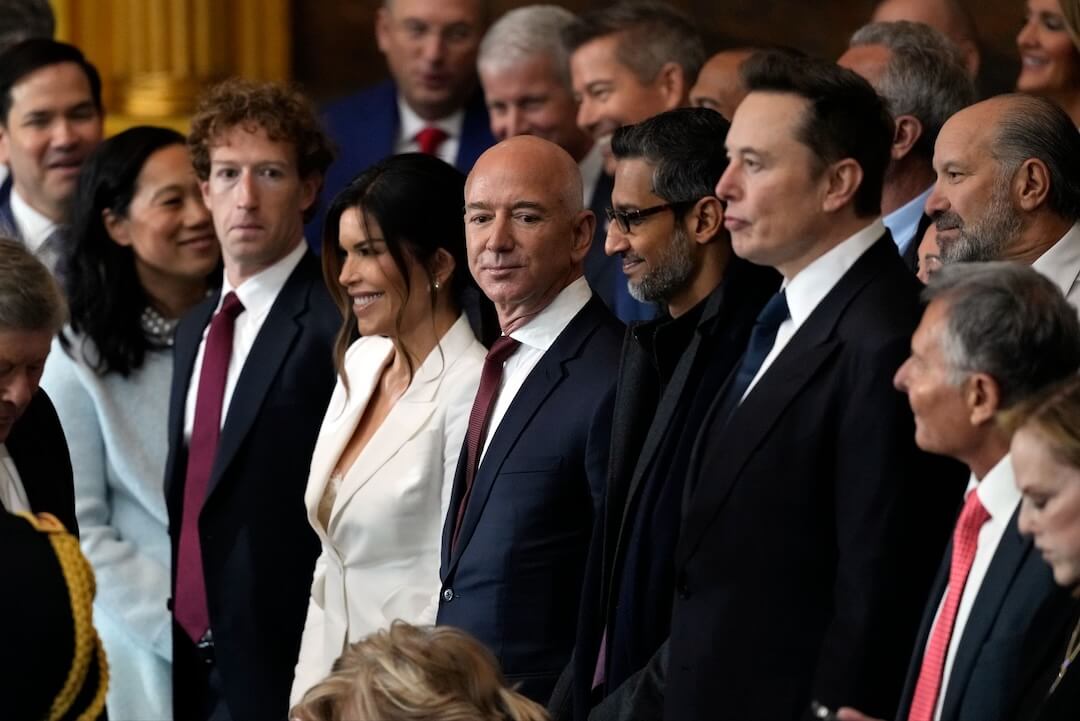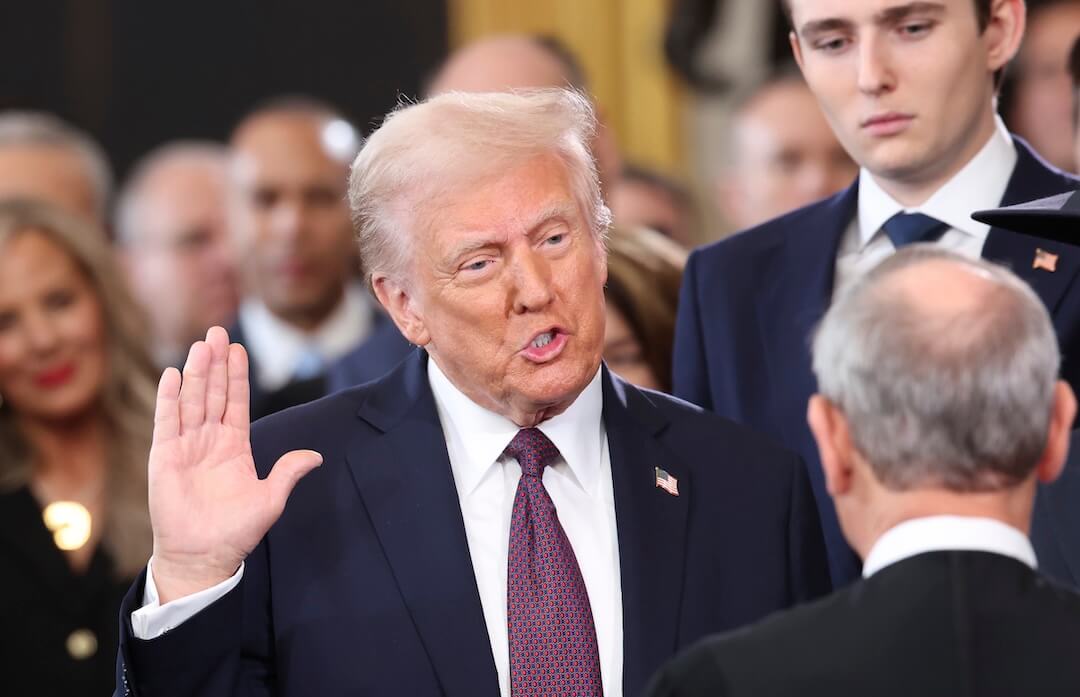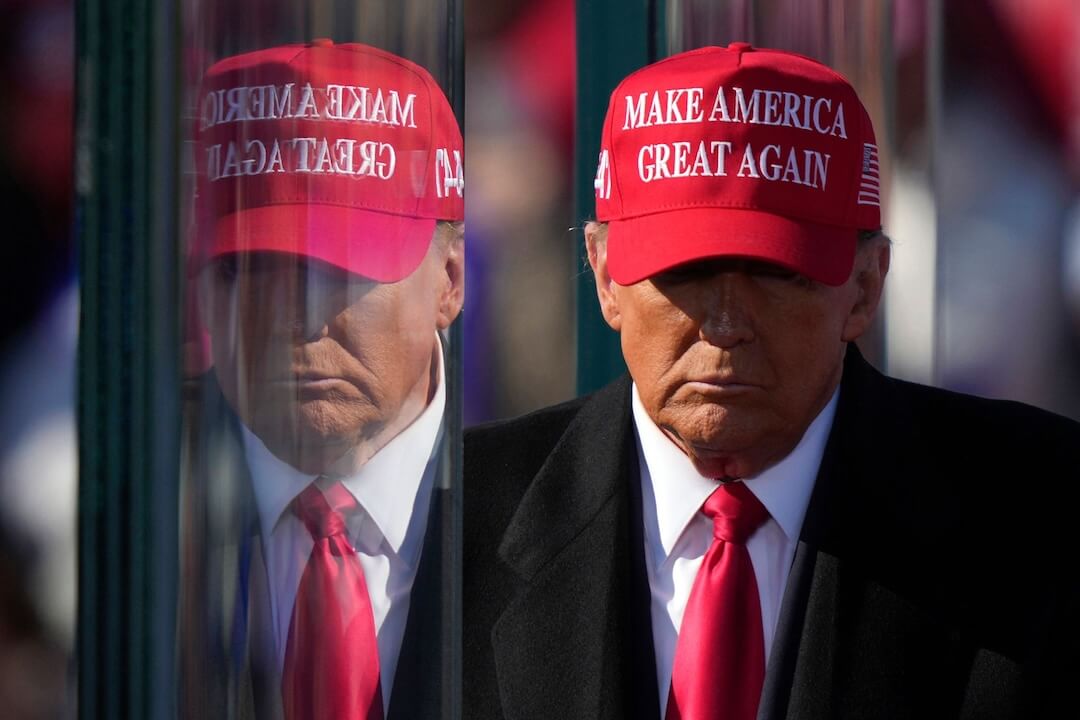Former President Donald J. Trump, an American citizen of German-Scottish descent, misuses the terms “nationality” and “ethnicity” when making racist comments about undocumented migrants, political opponents and prosecutors and judges.
The news media subtly reinforce this linguistic error by not noting the distinction between ethnicity and nationality. Nationality is defined as “the status of being a citizen or subject of a particular state.” Ethnicity refers to “a group regarded as ultimately of common descent.”
When Trump misuses these terms, he can decide who is and is not a real American. It’s a common microaggression. American citizens of Asian descent are routinely asked, “Where are you from, really?” People of Latino, Middle Eastern and African heritage are excluded in certain communities by skin color alone.
The media has further muddied the issue by associating Trump’s racist speech with Germany’s despised Nazi regime. Here is an example by The Associated Press:
Facing criticism for repeatedly harnessing rhetoric once used by Adolf Hitler to argue that immigrants entering the U.S. illegally are “poisoning the blood of our country,” Trump insisted he had no idea that one of the world’s most reviled and infamous figures once used similar words.
Trump may or may not be telling the truth about not reading Hitler’s “Mein Kampf,” which includes this excerpt: “All great cultures of the past perished only because the originally creative race died out from blood poisoning.” However, he apparently does believe that “American” is an ethnicity, not a nationality, whose citizens have distinct biological traits associated with northern European countries.
He once derided immigrants from “shithole countries” like Haiti and El Salvador, adding, “We should have more people from Norway.” The 2020 Census states that these ethnicities make up the majority of citizens who classify as white: English (46.6 million), German (45.0 million) and Irish (38.6 million).
Many white and Black citizens self-identify as American rather than their own ancestral origin or descent. “Skin color does matter, but beyond that, ancestral origins are no longer important for those whites and blacks who are far removed from the immigration experience,” an article published by the National Institutes of Health said.
Ironically, Indigenous tribes who rightly can claim American ethnicity are excluded from the designation. They are people of color.
A sordid history
Trump has a penchant for questioning whether opponents are real Americans, as The New York Times notes. As early as 2011, Trump questioned whether Barack Obama was born in the United States, initiating the birther movement. He also leveled the same suspicion about Nikki Haley, formerly his GOP opponent in 2024. Trump has promised to end birthright citizenship under the 14th Amendment to the Constitution.
A study published in Science Direct, titled “Trickle-down racism: Trump’s effect on whites’ racist dehumanizing attitudes,” links three outcomes with his rhetoric:
- “Whites learn the attitudes of their favored political candidate and update their own beliefs accordingly.”
- “Trump’s rhetoric signaled to many whites a shift in norms about whether expressions of racism are socially acceptable.”
- “Trump’s racist signals may have polarized” the political landscape, “eliciting a backlash from white Democrats “who have become especially liberal in their expressed racial attitudes over the past decade.”
Trump bases ethnicity on how people “look,” using that word to sully the impartiality of Judge Juan Merchan, who presided over his hush-money trial in New York: “Just take a look. Take a look at him. Take a look at where he comes from. He can’t stand Donald Trump. He’s doing everything in his power.”
Trump has made similar remarks about other judges. In 2018, he lambasted Indiana-born Judge Gonzalo Curiel, who presided over a fraud case against Trump University: “Let me just tell you, I’ve had horrible rulings, I’ve been treated very unfairly by this judge. Now, this judge is of Mexican heritage. I’m building a wall, OK? I’m building a wall.”
Last year, PBS “NewsHour” noted that Trump “has used terms such as ‘animal’ and ‘rabid’ to describe Black district attorneys.” He routinely calls Black prosecutors “racist,” making unsupported assumptions about their personal lives. “And on his social media platform, Truth Social, Trump has deployed terms that rhyme with racial slurs as some of his supporters post racist screeds about the same targets.”
Colombia-born District Judge Aileen Cannon, appointed by Trump in 2020 and currently overseeing his classified documents case, has been spared such humiliation because of her seeming bias in his favor. Imagine how Trump might have treated Cannon if she fast-tracked his case in the manner of Obama-appointed federal Judge Tanya Chutkan, presiding over his Jan. 6 indictments, whom he has called “highly partisan” and “very biased and unfair.”
The Guardian compiled a litany of Trump’s recent racist remarks, including the aforementioned “blood poisoning” as well as these slurs and threats:
- “We pledge to you that we will root out the communists, Marxists, fascists and the radical left thugs that live like vermin within the confines of our country.”
- “If you go after me, I’m coming after you!”
- Manhattan District Attorney Alvin Bragg “is a Soros-backed animal who just doesn’t care about right or wrong.”
Other media outlets such as The New York Times and U.S. News and World Report also assembled lists of Trump’s racial slurs over the years, especially ones made at rallies. Reporters covering those events mention so-called white supremacy dog whistles but typically fail to associate them with the new ethnicity. For instance, at one rally, Trump promised to take back “that beautiful, beautiful house that happens to be white.”
White noise
Trump has redefined white not only by racial features but also by political affiliation. Brittanica defines the GOP platform as restoring America to greatness by eliminating “foreign influence, both within its borders (via immigration and multiculturalism)”; by greatly reducing immigration, “particularly from developing countries”; and by encouraging or enforcing “what MAGA members consider to be traditional American values.”
What, exactly, are those values?
Civic virtues alluded to or articulated in our charter documents — affirmed over time by the U.S. Supreme Court — make no reference to American ethnicity:
- Respect for the individual and commitment to equal opportunity.
- The belief that our common interests exceed our individual differences.
- Concern for those who come after us.
- The belief that individual rights and privileges are to be exercised responsibly.
- The conviction that no one is above the law.
- Tolerance for the views of others.
- Support for freedoms enunciated in the Bill of Rights, including freedom of religion, of the press, of speech, and of the right to assemble.
These tenets define “the American experiment,” described by George Washington in his 1789 inaugural address. He vowed to preserve “the sacred fire of liberty and the destiny of the republican model of government … staked on the experiment entrusted to the hands of the American people.”
That model of governance has been altered by the Republican Party, whose newfound autocratic beliefs created a new ethnicity defined racially, geographically and politically by two primary colors: red and blue.
A CNN report titled “Red states are building a nation within a nation” said that such states have pushed social policy “sharply to the right … with a set of rules and policies that diverge from the rest of America more than in almost any previous era.” The emphasis no longer is on civic virtues but about classroom censorship and restrictions on abortion, immigration, diversity programs and LGBTQ+ rights.
Trump’s grifter “USA Bible” even establishes a revised MAGA religion for the new ethnicity, associating Christianity with our charter documents — the Declaration of Independence, U.S. Constitution and Bill of Rights — rather than on the Golden Rule, 10 Commandments, or Beatitudes of Jesus of Nazareth. (Indeed, many conservatives believe the teachings of Christ are too liberal and weak, especially the Beatitudes, condemning them as “liberal talking points.”)
It is perfectly legitimate to be proud of the American experiment that withstood previous assaults on democracy, from the slave atrocities of the Civil War to the voter suppressions of the Civil Rights Era. However, including charter documents in a King James Bible sullies the First Amendment’s “Establishment Clause,” which prohibits the government from making any law “respecting an establishment of religion.”
Notable exceptions
American exceptionalism is based on our government of checks and balances. Britannica defines exceptionalism as global high regard “made on the basis of the country’s founding,” spawning the idea that the United States “is a unique and even morally superior country for historical, ideological, or religious reasons.”
Since Trump, that image has been tarnished. The Pew Research Center noted in 2020 that the former president inspires much less confidence worldwide than his predecessor, Barack Obama. “Trump’s foreign policies are deeply unpopular. Support for Trump and these policies abroad disproportionately comes from people on the ideological right and those who favor right-wing populist parties in Europe.”
Certainly, we can celebrate conservative rural values: “a close-knit sense of community; strong family support systems and neighborly social ties; religious affiliation; pride in self and family; self-reliance and independence; the importance of justice, loyalty, and faith; and a strong work ethic.”
The problem with this new ethnicity is the danger of losing that legendary essence. Trump-based norms now allow us to exclude by race or appearance “others” in our communities; to welcome those only with similar heritage, social status and religion; to devalue families and work ethic of immigrants; and to dilute via partisan politics our notion of impartial justice.
Loyalty no longer is about country but candidate.
Broken covenant
The news media is complicit in this outcome, documented in my Poynter analysis, “How will the news media cover autocracy if Trump wins in 2024?” In it, I noted how Trump plans to terminate the Constitution, send in the military to compel his agenda, and mandate the death penalty for drug sellers as well as shooting shoplifters as they leave the store. He also has suggested executing former Joint Chiefs chairman Mark Milley and would restrict and punish objective journalists and “make them pay” for critical coverage.
I also referenced the January/February issue of The Atlantic admonishing news organizations that rely “on his vile words and scandalous deeds for their financial health, squeezing droplets of news from his every tweet even if the public had nothing to learn.”
Another valuable resource is the nonpartisan Protect Democracy’s “Authoritarian Playbook,” which encourages journalists to address three questions when covering Trump:
- How much does this action deviate from recent precedent?
- To what degree is this happening?
- Does this action present a systemic risk to democracy?
I would now add these recommendations:
- Distinguish nationality and ethnicity in race-based coverage.
- Clarify what our charter documents state about American values.
- Define what loyalty means according to those documents.
On May 1, 2024, Loyalty Day, President Joe Biden published a proclamation about nationality: “America is home to people from every place on Earth, some whose ancestors have been here for thousands of years and others who have only just arrived. We all came from somewhere, but we are all American — loyal not to a person or a place but to an idea: We are all created equal and deserve to be treated equally throughout our lives.”
In conventional news coverage, Biden’s statement might be easily overlooked as puffery, since many White House proclamations are; but the concept of loyalty has been sullied by Trump, redefined, just as ethnicity has. It no longer means being true to American democracy, virtues and ideals. As NBC News reports, the term has morphed into “loyalist,” supporting the ruler at all costs, parroting his Big Lie about the 2020 election, and joining his Truth Social pity parties.
Reporters might associate loyalty with safeguarding the American experiment rapidly fading from our collective memory.
It behooves editors and reporters to read the 2001 special issue of Neiman Reports, “The Elements of Journalism” by Bill Kovach and Tom Rosenstiel. They defined the role of a free press in a functioning democracy. Standard two focuses on our “first loyalty,” the source of our credibility: “A commitment to citizens is more than professional egoism. It is the implied covenant with the public.”
Last year, the Gallup organization surveyed news media credibility, noting that a mere 32% of Americans trust the Fourth Estate “a great deal” or “a fair amount” to report the news impartially. “A record-high 39% register ‘none at all,’” meaning nearly four in 10 Americans “completely lack confidence in the media.”
If we continue to violate our covenant with the people, those figures only will worsen after the contentious 2024 presidential election. Presumptive GOP candidates and adherents already are laying the groundwork to contest the people’s choices in any unfavorable outcome.
That should be the focus of the news media in the months prior to the Nov. 5 election.
Few have articulated that better than filmmaker and historian Ken Burns, who said in his May 19, 2024, Brandeis commencement speech that America is at a crossroads.
“There is no real choice this November. There is only the perpetuation, however flawed and feeble you might perceive it, of our fragile 249-year-old experiment or the entropy that will engulf and destroy us if we take the other route.” He added that the presumptive Republican nominee “is the opioid of all opioids, an easy cure for what some believe is the solution to our myriad pains and problems.”
The solution to our collective difficulties relies on the news media restoring its credibility and covenant with the people so that they make intelligent decisions in the voting booth, affirming the values of democracy and denouncing the new ethnicity that endangers it.







